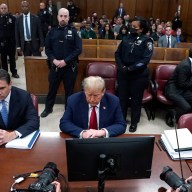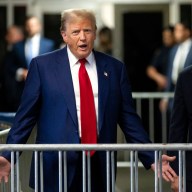By Sijia Jiang and Sue-Lin Wong
HONG KONG/SHENZHEN, China (Reuters) – The chairman of ZTE Corp <000063.SZ> <0763.HK> apologized to staff and customers on Friday after the Chinese technology firm agreed to pay a $1 billion fine to the United States to end a supplier ban that has crippled its business.
The deal allows China’s second-largest telecoms equipment firm to restart operations, reaffirm supplier relationships and rebuild trust with global clients, as it works to move on from an episode which it said threatened its very existence.
But industry experts estimate it would take at least a month for ZTE to ship phones again after the ban is lifted, while employees fear job cuts, wage reductions and a potential loss of customers, as the firm is set to reshuffle senior management.
The company agreed on Thursday to pay the fine and overhaul its leadership to lift the ban which has been in place since April.
The ban, which traces back to a breach of a U.S. embargo on trade with Iran, had prevented ZTE from buying the U.S. components it heavily relies on to make smartphones and other devices.
The case has become highly politicized and a key focus of whipsawing talks as Washington and Beijing look to avert a trade war.
In a memo sent to staff on Friday, ZTE Chairman Yin Yimin apologized to employees, clients, shareholders and business partners and said the firm would look to learn from its errors and hold those responsible accountable, a member of staff told Reuters.
“This issue reflects problems that exist with our firm’s compliance culture and at management level,” Yin wrote, according to the staffer, adding the incident was caused by the mistakes of a few ZTE leaders and employees.
“The activation of the denial order has caused huge losses for the company. The firm has paid a disastrous price.”
ZTE did not respond to multiple requests for comment.
“Paying the fine is no problem, the real difficulty lies ahead and getting future business, especially overseas. Market confidence is lost,” another employee told Reuters.
The person added that staff feared there would be pay cuts and possible job losses. “Bonuses are bound to be affected.”
Under the deal, ZTE will change its board and management within 30 days, pay a $1 billion fine and put an additional $400 million in escrow. The deal also includes a new 10-year ban that is suspended unless there are future violations.
A third member of staff said all ZTE employees were being called to have group meetings to “deeply reflect” on the case, including attending compliance training and writing up reports.
The management shake-up would also likely create instability – at least in the short-term.
“If so many bosses are gone at the same time, what would the succession process be like? There’s going to be lots of internal power struggles to come,” the third employee said.
The employees declined to be identified because of the sensitivity of the matter.
US HANDSET SHARE THREATENED
ZTE pleaded guilty last year to conspiring to evade U.S. embargoes by buying U.S. components, incorporating them into ZTE equipment and illegally shipping them to Iran. The new sanction in April was because the firm breached terms of an agreement about disciplining executives responsible for the original violations.
Analysts said the fine – after a $1.2 billion settlement last year – would be a heavy burden, but not crippling for the company. “ZTE can financially handle it,” said brokerage Jefferies in a report late on Thursday.
The Shenzhen-listed firm had close to 30 billion yuan ($4.7 billion) of cash and short-term investment as at the end of March. Net profit last year was around $795 million.
“We do not believe ZTE will need to immediately raise any debt or equity financing to fund the cash penalty,” said Jefferies.
At ZTE’s headquarters in Shenzhen, most employees Reuters spoke to were reticent to comment on the U.S. deal.
One office worker, who only gave his surname Liu, said he was not worried about the firm making major staff cuts or failing. “I’m not planning on looking for a new job.”
As a smartphone seller, ZTE was ranked the fourth-biggest in the United States in the first quarter of the year with an 11.4 percent market share, but has since seen sales of its handsets suspended.
“It will be very difficult for ZTE to keep its position as the fourth-biggest smartphone vendor in the U.S. for 2018” considering damage to the brand, said Shanghai-based analyst Mo Jia at technology researcher Canalys.
(Reporting by Sijia Jiang and Sue-Lin Wong; Writing by Adam Jourdan; Editing by Miral Fahmy and Christopher Cushing)


















